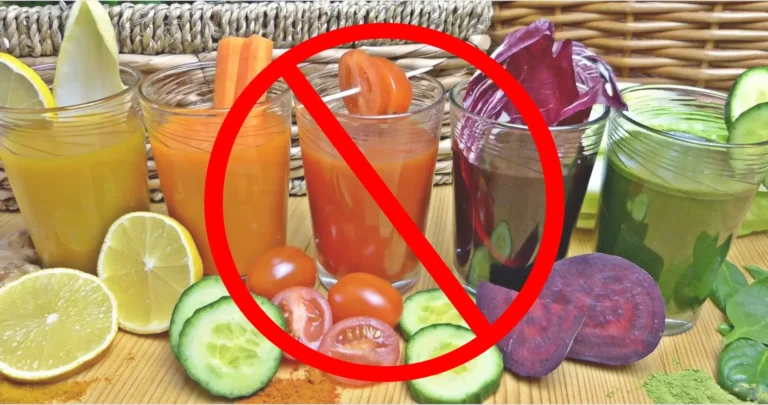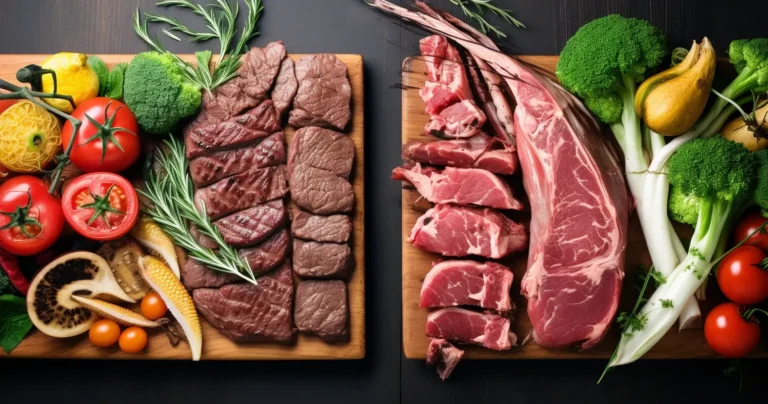In today’s article you will learn all banana nutrition facts you need to know in 2024 in order to understand, when they are a good fit for your diet and when to avoid them.
All information comes from reliable scientific sources and nutrition experts to ensure you get the most accurate and up-to-date data on bananas.
In short, 100g of bananas contain the following nutrients:
– 368-455kJ / 88-109kcal
– 22,8g carbohydrates
– 1,1g proteins
– 0,3g fats
– 2,6g fiber
– 8,7mg vitamin C (10% of daily requirement)
– 0,4mg vitamin B6 (20-33% of d. r.)
– 330mg potassium (10-15% of d. r.)
– 27mg magnesium (7-10% of d. r.)
Banana Nutrition Facts
Nutritional Profile of Bananas
Lets have a deeper look at the different nutrient contents in order to understand in which areas bananas score well and in which they do not.
Calorie content
Let’s start with the basics. An average banana contains around 105 calories. This makes bananas one of the most calorie-dense types of fruit – but that doesn’t make them any less healthy
Carbohydrates
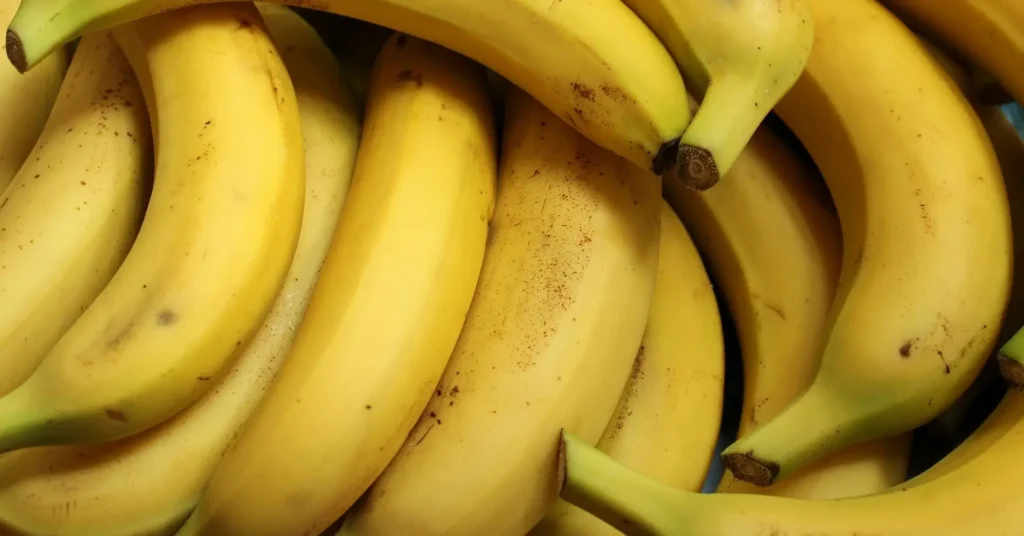
Bananas are an excellent source of natural carbohydrates that provide a sustained source of energy. With around 27 grams of carbohydrates per banana, they can give you the boost you need for an active day.
Due to their high sugar content, they are particularly suitable as a quickly available source of energy, as required by athletes, for example.
Proteins
Protein is not the strong point of bananas, but they still help to balance your overall nutrient intake. At around 1.3 grams of protein per banana, they may not be protein bombs, but every little bit counts.
Fats
Bananas are basically fat free with less than 0,3g per banana.
Fiber
Fiber is essential for healthy digestion, and bananas contain about 3.1 grams per piece.
With a recommendation of 30g fiber per day, a banana already covers over 10%, which increases the satiety effect and reduces the rise in blood sugar.
Micronutrients
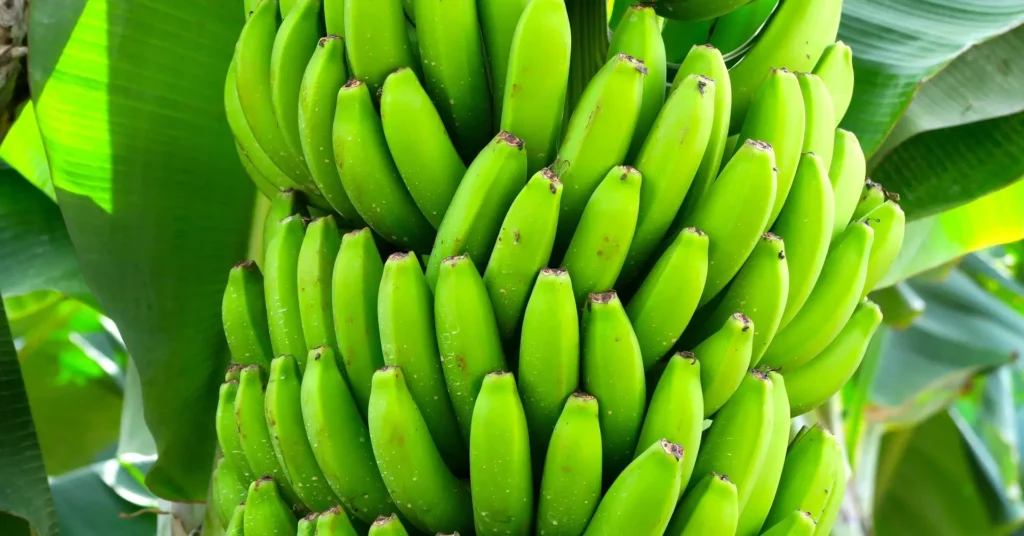
Vitamin C
On average, 100 grams of bananas contain around
8.7 mg of vitamin C, which is around 10% of the daily requirement of 75 milligrams for women and 90 milligrams for men.
Vitamin C, also known as ascorbic acid, plays a crucial role in the human body. It is a powerful antioxidant that helps protect cells from harmful free radicals.
In addition, vitamin C is responsible for the formation of collagen, a protein that structures and strengthens skin, blood vessels, bones and cartilage.
A sufficient vitamin C level is also important for the immune system, as it strengthens the body’s defenses and increases resistance to disease.
Last but not least, it also promotes the absorption of iron from plant sources, which is particularly important for vegetarians and vegans.
Vitamin B6
In about 100 grams of bananas you will find an average of about 0.4 milligrams of vitamin B6. This may not seem like a lot at first glance, but with an average daily requirement of 1.2 to 2.0 milligrams, these 100 grams already cover 20-33% of the daily requirement.
Vitamin B6, also known as pyridoxine, is crucial for many functions in the body. It plays a key role in the metabolism of proteins by helping to break down amino acids and thus enabling the formation of important messenger substances.
In addition, vitamin B6 is important for the functioning of the nervous system as it is involved in the synthesis of neurotransmitters. These chemical messengers are crucial for the transmission of signals between nerve cells and therefore influence mood, sleep and cognitive function.
Potassium
Around 100 grams of bananas contain an average of 330 milligrams of potassium. With an average daily requirement of 2000 to 3000 milligrams, this 100g cover 10 to 15 percent of the daily needs.
Potassium is an electrolyte that plays a crucial role in regulating the body’s water balance and acid-base balance.
A balanced potassium level is also important for the function of nerve and muscle cells. It supports the transmission of nerve impulses and helps to maintain normal muscle contractions.
In addition, potassium contributes to the regulation of blood pressure by balancing the negative influence of sodium.
Magnesium
Around 100 grams of bananas contain an average of around 27 milligrams of magnesium covering 7 to 10 percent of the recommended daiy requirement.
Magnesium is involved in numerous important functions in the body. It plays a crucial role in energy metabolism by supporting the conversion of nutrients into energy.
Magnesium is also important for muscle function, especially for muscle relaxation after a contraction. In addition, magnesium contributes to the maintenance of healthy bones and teeth and plays a role in the regulation of blood sugar levels and blood pressure.
The maturing
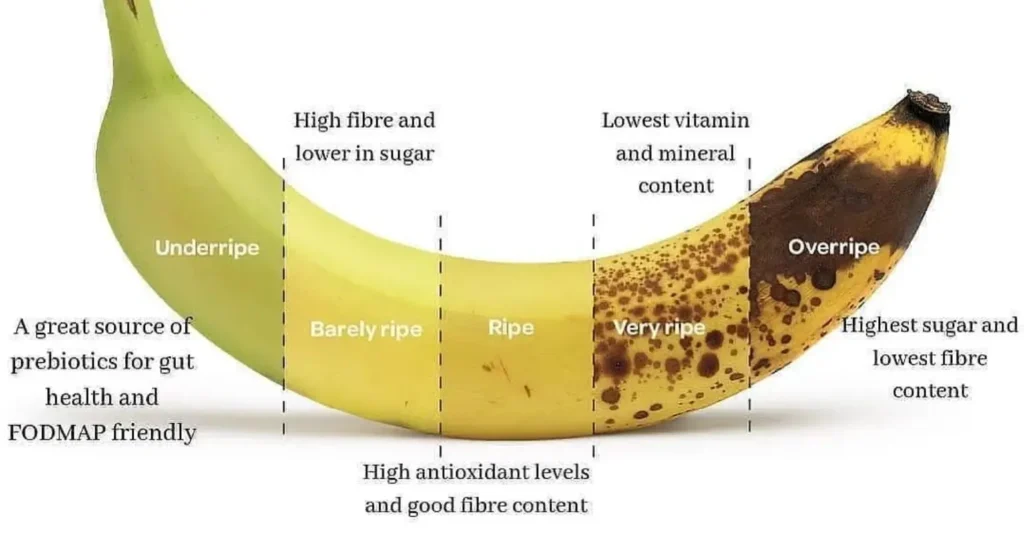
The ripening process of bananas is controlled by the natural plant hormone ethylene. During ripening, bananas produce more ethylene, which acts as a ripening gas.
This gas accelerates the breakdown of starch into sugar, the breakdown of chlorophyll (responsible for the green color) and the formation of aromas.
Calorie and sugar content
The sugar content of bananas increases as they ripen. Green, unripe bananas contain more resistant starch, which breaks down more slowly in the digestive tract and has less of an effect on blood sugar levels.
With ripening, this starch is converted into simple sugars, which leads to a sweeter taste and slightly increases the calorie content.
Antioxidants
During the ripening process, the antioxidant content of bananas also increases. This helps to reduce oxidative stress and protect cells from damage.
Vitamins and minerals
Ripe bananas contain higher amounts of vitamin C and vitamin B6 compared to green bananas.
Resistant starch
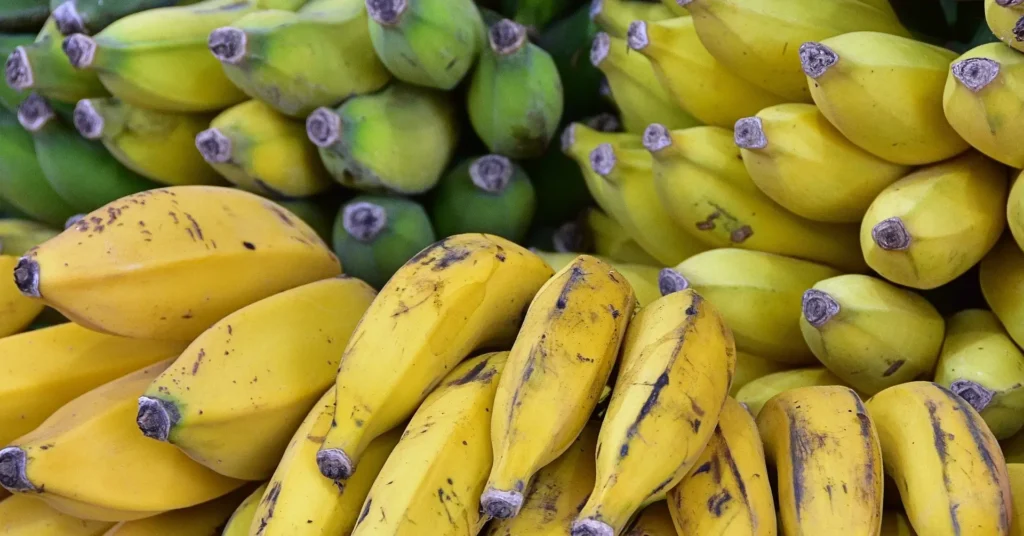
As bananas ripen, their resistant starch content decreases. This makes ripe bananas easier to digest and can be beneficial for people with sensitive stomachs.
In summary, most of the ingredients change for the better during the ripening process including the vitamin and antioxidant content.
Only the high content of resistant starch in unripe bananas makes them interesting for people who want to do something good for their gut microbiome.
Health benefits
Heart health
The fiber and potassium contained in bananas have a positive effect on heart health. They help to regulate blood pressure and reduce the risk of heart disease.
Digestive support
Fiber is the key to healthy digestion. Bananas promote intestinal health, regulate bowel movements and can even provide relief from stomach discomfort.
Energy supply
The natural sugars in bananas, especially fructose and glucose, make them a quick source of energy. This is particularly useful before exercise to replenish your energy reserves.
Comparison to other fruits
In order to better classify the ingredients mentioned, we will now compare them with the typical content of oranges, apples and strawberries.
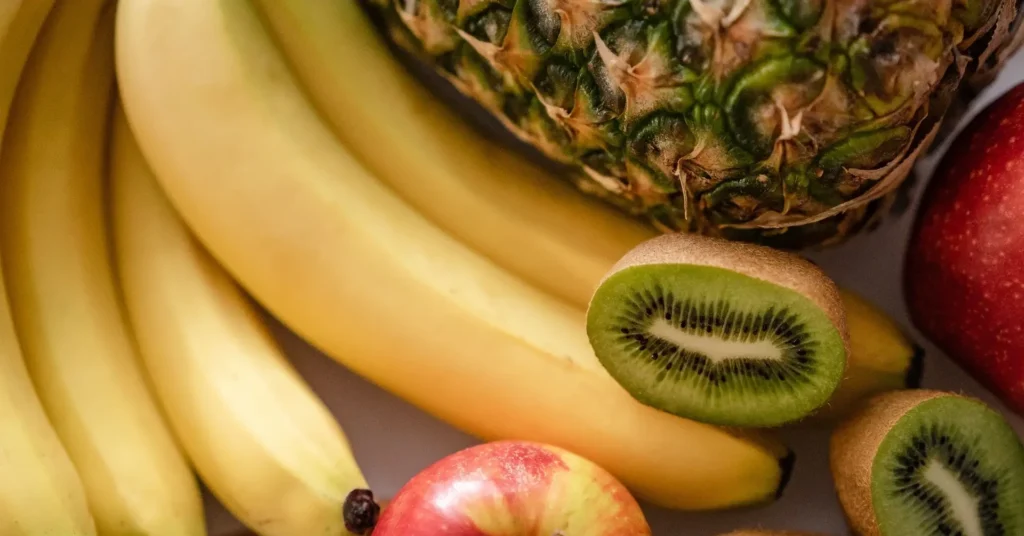
Calories
Bananas are known for their moderate calorie intake. In about 100 grams of bananas you will find about 89 calories. Oranges are in a similar range, while strawberries and apples tend to have slightly fewer calories per 100 grams.
Sugar
Bananas have about 12 grams of sugar per 100 grams, with oranges and apples having comparable amounts. Strawberries, on the other hand, are a sweet but low-sugar option with around 4 grams of sugar per 100 grams.
One key difference: bananas contain a large proportion of sugar in the form of fructose, which makes them rather critical for people with a fructose intolerance. Apples and oranges contain less fructose than bananas (about 50% fructose 50% glucose), but strawberries contain the least fructose.
Fiber
Bananas lead in the fiber point with 2.6 grams per 100g. They are followed by apples with 2.4g and strawberries with around 2g.
Vitamin C
Oranges are particularly rich in vitamin C, with around 53 milligrams per 100 grams. Bananas, in comparison, contain around 8.7 milligrams. Strawberries are also an excellent source of vitamin C, while apples contain slightly less.
Vitamin B6
Bananas are a good source of vitamin B6, with about 0.4 milligrams per 100 grams. Oranges and apples have comparatively lower amounts, while strawberries have similar levels to bananas.
Potassium and Magnesium
Bananas contain particularly high levels of potassium and magnesium; neither oranges, apples nor strawberries can keep up in these categories.
Overall, this comparison shows that each fruit has its own benefits and nutrients. The choice between bananas, oranges, strawberries and apples can therefore also depend on individual nutritional needs and personal preferences.
If you want to reduce your overall sugar consumption, berries are an excellent choice. If you want to add more Vitamin C, oranges are your way to go.
However, Bananas lead the potassium, magnesium, vitamin B6 and fiber categories
Bananas for specific groups of people
Bananans for toddlers
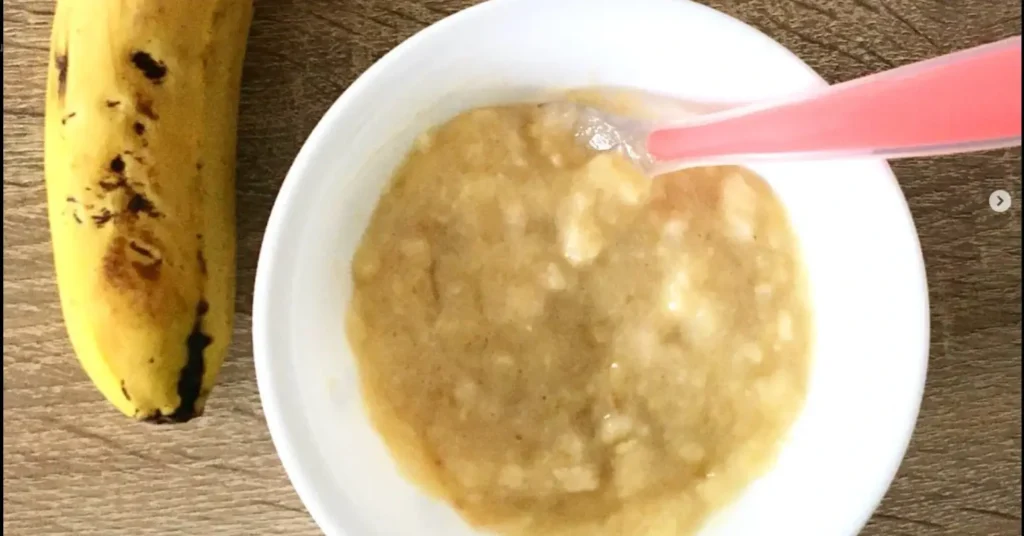
Bananas are one of the first solid foods that many parents introduce to their toddlers. The soft texture, sweet taste and nutritional benefits make bananas a popular choice for feeding toddlers.
Advantages
Easily digestible: Bananas are easy to digest, making them an ideal option for little stomachs that are still getting used to solid foods.
Dental health: Compared to sugary snacks, bananas are tooth-friendly and do not promote tooth decay.
Things to keep in mind:
Choking hazard: cut bananas into small pieces to minimize the risk of choking or swallowing, especially if the child is not yet able to chew on their own.
Allergies and tolerance: Although bananas rarely cause allergic reactions, it is important to look out for signs of intolerance or allergies when introducing them to your toddler’s diet for the first time.
Note ripeness: Make sure bananas are sufficiently ripe, as this not only improves flavor but also makes them easier for little tummies to digest.
Bananas for athletes
For athletes, bananas are not only a convenient snack, but also a natural source of energy and important nutrients that are crucial for optimal performance.
Advantages
Quick energy: Bananas contain natural sugars, fructose and glucose, which provide a quick source of energy for athletes, especially before or during intense physical activity.
Electrolyte balance: With a high potassium content, bananas support the regulation of electrolytes, which is particularly important to prevent muscle cramps and maintain hydration.
Vitamin B6 for energy metabolism: The vitamin B6 it contains plays a key role in energy metabolism, which is beneficial for athletes during intensive training sessions.
Natural antioxidants: Bananas contain antioxidants that can help reduce oxidative stress that can be caused by intense exercise.
Things to keep in mind:
Timing: bananas are particularly good before or during exercise to ensure a quick energy boost.
After training, you should rather choose slowly digestible carbohydrates such as whole-grains as an energy source to replenish your energy stores in the long term.
How many calories does a banana have?
An average banana contains about 105 calories.
What is the sugar content of a banana?
One banana contains about 14 grams of sugar, divided into 4.9g fructose, 6.7g glucose and 2.4g sucrose.
Are bananas good for digestion?
Yes, bananas contain pectin, a soluble type of fiber that can aid digestion.
What minerals do bananas contain?
Bananen enthalten wichtige Mineralstoffe wie Kalium, Magnesium und Mangan.
Conclusion
In this article, we’ve explored the comprehensive banana nutrition facts – including (hopefully) everything you need to know.
If so, maybe you have time to leave a short comment with feedback? I would really appreciate it.
Also, you might enjoy this article in which we discuss the most important egg nutrition facts or this one comparing a plant based and meat based diet.
Thank you and see you soon 🙂




